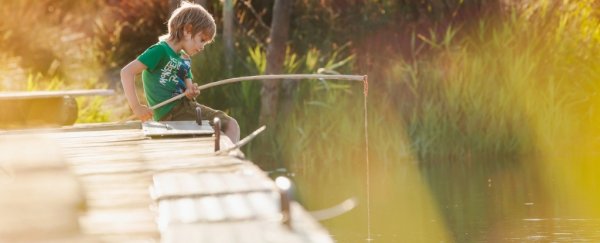Spending solitary time in the great outdoors, whether it's fishing, hunting or exploring, could help foster a kid's strong bond with nature, a new study suggests.
Combine those reflective moments in nature with outdoor social activities, such as camping or scouts, and this vital connection to the natural world could potentially last a lifetime.
Not only is this beneficial for a person's long-term mental and physical health, it's also good for the future of our planet, say the researchers.
"There are all kinds of benefits from building connections to nature and spending time outside," says Kathryn Stevenson, an environmental education researcher from North Carolina State University's Department of Parks, Recreation and Tourism Management.
"One of the benefits we're highlighting is that children who have a strong connection to nature are more likely to want to take care of the environment in the future."
The new study builds on growing evidence that being outdoors as a kid can improve a person's wellbeing and cement their affinity for nature. Even access to city parks and urban trees can make a big difference.
Stevenson's newest research suggests that solitary moments in these spaces are especially important when it comes to kids identifying with nature and feeling comfortable in it - which will hopefully make them want to protect it when they're older.
Of course, that doesn't necessarily mean adults shouldn't be supervising kids to make sure they're safe. But the research indicates there could be benefit from stepping back a little and observing children in nature instead of taking over or getting involved.
In the study, researchers asked 1,285 children in North Carolina, between the ages of 9 and 12, to answer a series of questions about their time in the outdoors.
They wanted to know whether these kids spent time hunting, fishing, hiking, camping or playing sports outside, and how they felt about the natural world in general. Were they comfortable in the wilderness? Did they enjoy being outside? Did they ever pay close attention to different plants and animals around them?
"We saw that there were different combinations of specific activities that could build a strong connection to nature; but a key starting point was being outside, in a more solitary activity," says Stevenson.
Children who spent time reflecting or focusing on the outdoors while fishing, hunting or hiking also displayed stronger connections to nature.
This isn't to say that social time outdoors isn't important - the study found social interactions with peers or adults can reinforce the strongest bonds to nature - but having some time to reflect by ourselves may have a greater impact in childhood than we realise.
Previous research has also highlighted the importance of solitude in nature, and yet in the past, fishing and hunting have been left out of that equation.
But the authors argue that these activities also require intense focus on specific aspects of the natural world. And in a time where many kids know more Pokémon than native wildlife, this could be an important avenue for biodiversity knowledge and even conservation behaviours.
Other than bird watchers, one study found that hunters were actually one of the more active conservationists among adult outdoor recreationists.
"We have seen that when people who go into environmentally focused careers reflect on their lives, they describe having formational experiences outdoors during childhood, like walking on a favorite trail or exploring the creek by their home," says Stevenson.
"We know that these kind of meaningful life experiences are motivating going forward."
If we can get kids interested in such activities in their most formative years, we could help raise a new generation far more attuned to the environment than we ever were.
The study found that demographic variables like gender or ethnicity did not inherently predict a kid's connection to nature. While lower exposure to outdoor activities might be an indirect effect, once participation was accounted for, there were no significant differences among genders, or different races and ethnicities.
"While gender and ethnicity may influence the outdoor recreation experience, our findings indicate all students can develop similar levels of [connection to nature] if they are given the same exposure to nature," the authors write.
We just need to get outside.
The study was published in The Journal of Environmental Education.
